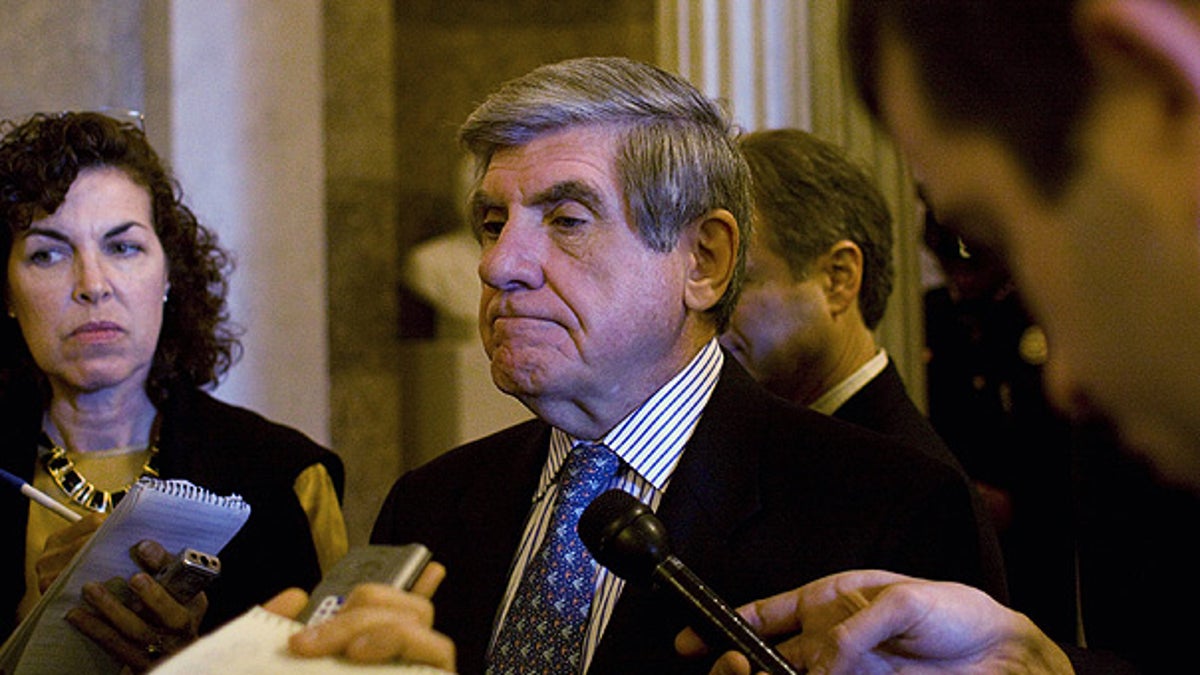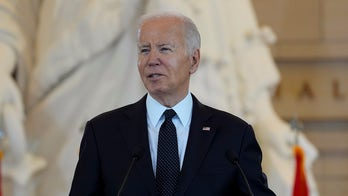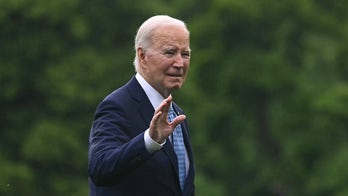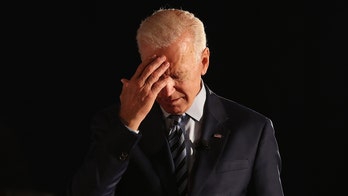
Nov. 3: Sen. Ben. Nelson talks to reporters about health care on Capitol Hill. (AP)
In an effort to erect a wall between taxpayer dollars and abortion coverage, a bipartisan group of senators unveiled an amendment Monday that would place strict limitations on abortion as part of the Senate health care reform bill.
Democratic Sen. Ben Nelson, along with other anti-abortion lawmakers, pushed for an amendment on the Senate floor Monday that would bar any private insurance company that gets federal money from covering abortions.
Nelson, the senior senator from Nebraska, called for the Senate to adopt a measure that closely mirrors language in the House version of the bill, which bans federally subsidized health insurance plans from covering abortion, even if the procedures are paid for entirely with customers' premiums. A new government insurance plan would also be barred from covering abortion -- except in cases of rape, incest or danger to the life of the mother -- under his proposal.
"I believe that the current health care reform we're debating should not be used to open a new avenue for public funding of abortion," Nelson said on the Senate floor, adding that his measure seeks only to apply current law -- known as the Hyde Amendment -- to the Senate health care bill. Enacted in 1976, the Hyde Amendment restricts federal funding of abortion for recipients of Medicaid, military health care and the federal employee health plan.
"Our amendment merely aims to extend the current standard to this new legislation," he said. "Most Americans do not support using taxpayer money to fund abortions."
The Senate is expected to vote on Nelson's amendment by Tuesday. The measure appeared unlikely to gain the necessary 60 votes in the 100-member Senate, according to numerous lawmakers.
Nelson has become a critical figure in the health care debate. He has pledged to vote with Republicans to filibuster the legislation if it does not include an amendment banning federal funding of abortion. Without his support, Democrats would need to pick up a Republican vote to pass their health care bill.
Republican Sen. Orrin Hatch of Utah, who is co-sponsoring the measure, called the language on abortion in the current Senate bill "very inadequate."
"This is really one whopping, lousy bill," Hatch said in an interview Monday with Fox News, adding that he does not think Democrats will score any Republican votes on the legislation unless the abortion amendment is added.
Other sponsors of the amendment include senators Robert Casey, D-Penn., Sam Brownback, R-Kan., John Thune, R-S.D., Mike Enzi, R-Wyo., Tom Coburn, R-Okla., Mike Johanns, R-Neb., David Vitter, R-La. and John Barrasso, R-Wyo.
If Nelson's amendment fails to pass, the issue will likely fall on the shoulders of Senate Majority Leader Harry Reid, who may face the daunting task of trying to strike a compromise on the issue.
Some Democrats, like Sen. Claire McCaskill of Missouri, are calling on the Senate to defeat any move to embrace the tough anti-abortion language in the House version of the legislation. McCaskill is accusing Nelson of looking to apply stricter regulations than what are already outlined under current law.
In an interview Monday with CBS's "The Early Show," McCaskill said the language in the bill now on the Senate floor retains long-standing policy prohibiting federal funds for abortion -- and that's sufficient. She said she believes an amendment by Nelson "goes further."
Under the Nelson plan, "you can't use private money in the private market," she said. "That goes too far."
Nelson's amendment has also been met with strong resistance from pro-choice groups, like Planned Parenthood, which also claim the measure "goes far beyond the Hyde Amendment and current law to restrict private health insurance coverage of abortion in the U.S."
"This amendment violates the spirit of health care reform by effectively prohibiting women from using their own money to buy private health insurance that provides comprehensive reproductive health care benefits," Cecile Richards, president of Planned Parenthood Federation of America, said in a statement Monday. "Health care reform is meant to guarantee quality, affordable health care coverage for all, not take benefits away from American women."
Democratic leaders hope to soften the House's tougher language in eventual House-Senate negotiations designed to send a bill to President Obama.
In a rare visit to the Capitol on Sunday, Obama urged Senate Democrats to make history by overhauling the nation's health care system, even if some of them might face angry voters. He stuck to general themes in his 45-minute closed-door speech and did not dwell on specific topics such as abortion.
The Senate bill would cover more than 30 million additional Americans over the next decade with a new requirement for nearly everyone to buy insurance. The federal-state Medicaid program for the poor would be expanded, and there would be a ban on unpopular insurance company practices such as denying coverage based on medical history.
It would create marketplaces where people could shop for and compare insurance plans. People with low incomes would get subsidies to help them buy coverage.
A government-run insurance program, or "public option," is one of the bill's most contentious issues. At Reid's urging, a group of moderate and liberal Senate Democrats met again Sunday to seek a compromise, after Obama's pep talk.
One idea calls for national nonprofit insurance plans to be administered by the Office of Personnel Management, which oversees the popular Federal Employees Health Benefits Program.
The proposal seems to appeal to a key Republican, Sen. Olympia Snowe of Maine, who met with Obama at the White House on Saturday.
On Sunday, Snowe called the possible compromise "a positive development" because it would give consumers more options for buying insurance.
Snowe's potential support for the Democratic-crafted bill is crucial. Supporters need 60 votes to overcome filibusters, and the chamber's 40 Republicans hope to draw at least one Democrat to their side.
It could be Nelson, who says he will not support final passage of a health care bill unless it includes the tight abortion restrictions he wants. If so, Democrats would have to woo moderate Republicans such as Snowe.
The Associated Press contributed to this report.




